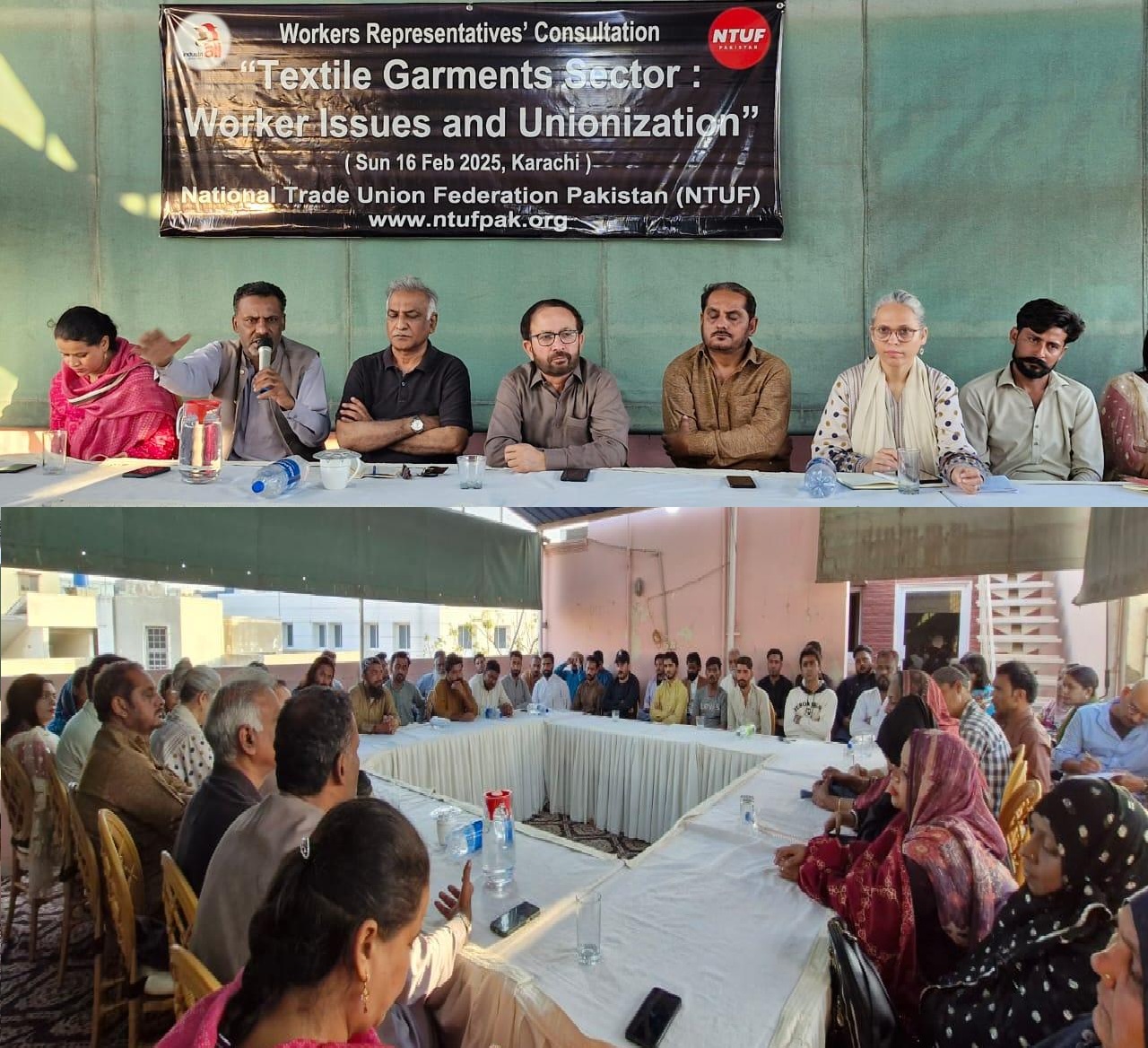"Labor Leaders Unite to Address Exploitation in Pakistan’s Textile Sector" declaration of the workers gathering
A gathering of labor representatives from the textile and garments sector was held at the central office of the National Trade Union Federation Pakistan (NTUF) to discuss the deteriorating conditions of workers and formulate a plan for their redressal.
The meeting addressed obstacles to unionization, the significance
of international agreements, and the importance of adhering to Organization for
Economic Co-operation and Development (OECD) guidelines, global framework
agreements, and due diligence requirements.
Comrade Zehra Khan, Co-Chairperson of IndustriALL Global Union
Textile & Garments Sector, presided over the meeting. Joint Director of the
Sindh Government’s Labor Department, District East, Mr. Athar Ali Shah, also
attended and assured participants of the department’s support in the
unionization process.
NTUF General Secretary Nasir Mansoor highlighted that the textile
and garments sector is the backbone of the country’s economy, employing
millions directly and indirectly. Despite being the highest foreign
exchange-earning sector, workers face severe exploitation due to the dominance
of local and international corporate groups over production processes.
He compared the sector’s importance to the economy with the
lifeblood of the human body, stating that factories producing for local markets
and international brands operate like labor camps. Violations related to wages,
working hours, social security, unionization rights, gender justice, and
workplace safety have reached alarming levels.
SITE Labor Forum (SLF) leader Riaz Abbasi pointed out that labor
laws, international conventions, and agreements between workers and brands are
blatantly ignored without accountability. He emphasized that the suppression of
workers’ rights to organize and bargain collectively has further worsened the
situation, with only a small fraction of private-sector workers receiving
official employment contracts.
Workers participating in union activities are immediately dismissed
to set an example, while factory managements create fake unions to obstruct the
formation of independent and democratic labor organizations. State institutions
often support these anti-worker tactics.
Zehra Khan, Co-Chair of IndustriALL-TGLS, stated that the
distinction between the formal and informal sectors has vanished, with the
textile and garments industry becoming entirely unregulated. Despite the
increasing number of factories and the wealth generated by the labor of over 15
million workers, working conditions and wages continue to deteriorate, with
over 90% of workers in the sector living below the poverty line.
She accused international brands and their local suppliers of
deliberately ignoring their commitments and reinforcing the exploitative
relationship between global and local capital. She stressed the urgent need for
a concrete action plan to counter this alliance and ensure that workers, who
contribute significantly to the textile supply chain, are recognized and
afforded legal rights, access to minimum wages, and social security.
She informed the participants that the 2023 update to the OECD
Guidelines for Multinational Enterprises emphasizes the obligation of companies
to respect workers' rights to establish or join trade unions without
interference. This includes avoiding actions that could influence workers'
decisions regarding union formation, which is critical in ensuring a fair and
equitable workplace.
More than 50 labor representatives from Karachi’s leading
export-oriented textile and garment factories—many of which are part of global
framework agreements like the Pakistan Accord—pledged to organize workers
against oppressive working conditions. They resolved to dismantle
employer-backed unions, expose anti-worker elements, counter conspiracies
against independent labor organizations, and ensure compliance with
international standards such as those outlined by OECD guidelines and due
diligence.
It was also decided that a nationwide Textile & Garments
Workers' Convention would be held in Karachi in mid-April.
Other speakers at the gathering included Rafiq Baloch, President of NTUF; Saira Bano, President of HBWWF; Aqib Hussain, Information Secretary of NTUF; and others.



Comments (0)